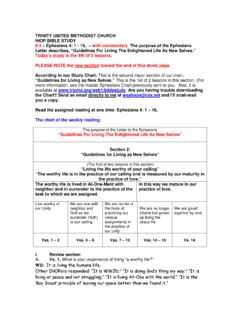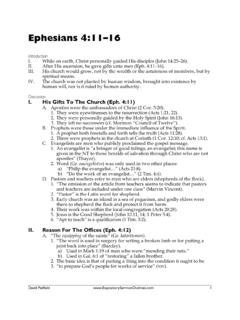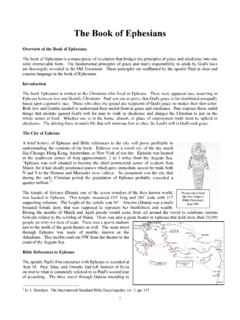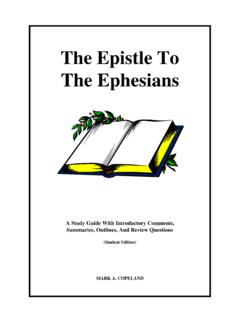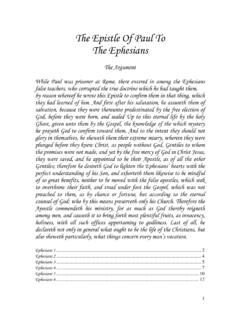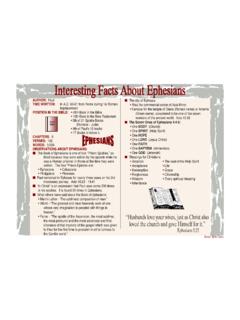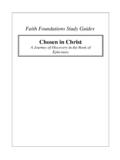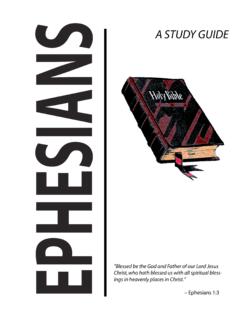Transcription of The Book Of Ephesians - Allan Turner
1 StudyofEphesiansA verse by verse study of God s eternal purposein and through Jesus Christ Allanita PressCONTENTSAn IntroductionIn 133 , Ephesus came under directcontrol of the Romans. During the firstcentury , the city was the capital ofthe Roman province of Asia. It was famous forits trade, art, and science, but it was even morerenowned for its Temple of Diana (GreekAr-temis), which was considered one of the sevenwonders of the world. It was a building of Ionicarchitecture, four hundred and twenty--five feetlong and two hundred and twenty feet wide. Itwas supported by one hundred and twenty--seven marble columns that were sixty feet of these were beautifully of the stones from this temple are on ex-hibit in the British Museum. In modern timesthis temple is in complete ruin, as is the city, andnot a living soul resides within its is located about three miles inlandfrom the Aegean Sea in the Cayster River harbor, which frequently silted up, made anexcellent seaport.
2 Three important roads met atEphesus. One brought trade from the east viaColossae and Laodicea. One came from Galatiavia Sardis and brought trade from Asia third important road was to the north. Thissystem of roads, coupled with the excellent sea-port, made Ephesus the fourth greatest city inthe Roman Empire (after Rome, Alexandria, andAntioch) with a population of approximately250, Origin Of The Ephesian ChurchWhen Paul was on his second preachingjourney, he was forbidden by the Holy Spirit topreach the word in Asia (Acts 16:6). For somereason unknown to us, the door of opportunityfor the preaching of the gospel in Asia was notyet open. The opening was in Europe, and Paulwas guided there by the Holy Spirit. On return-ing from Europe in about 53, Paul, alongwith his faithful helpers, Aquila and Priscilla,visited Ephesus (Acts 18:18--21). As was hiscustom, Paul entered the synagogue and rea-soned with the Jews (v.)
3 19), but nothing is saidabout anyone obeying the gospel. Nevertheless,they wanted Paul to stay a longer time withthem, but, pressed for time, he was not able todo so (v. 20), although he did promise to returnto them, God willing (v. 21).The Scriptures inform us that Aquila andPriscilla stayed behind in Ephesus (vv. 18,19).They are the church at Ephesus. Some time afterPaul's departure, Apollos visited the city (Acts18:24--28). Described as an eloquent man andmighty in the Scriptures, Apollos was an Alex-andrian Jew who had been instructed in theway of the Lord, but knew only the baptism ofJohn (v. 25). As his knowledge was imperfect,Priscilla and Aquila, upon hearing him speakpublicly, took him aside privately and ex-plained to him the way of God more accurately (v. 26). After this, Apollos desired to cross overto Achaia and the brethren [at Ephesus] wrote,exhorting the disciples to receive him (v.
4 27).The use of the brethren indicates there areothers at Ephesus who are now Christians be-sides Aquila and Priscilla. Who these otherChristians are, we are not told. The church isprobably still quite small and may possibly bemeeting in the home of Aquila and 54, after beginning his third preach-ing journey, Paul returns to Ephesus. Whilethere, he discovers some disciples who had notyet been baptized into Christ. After these twelveobeyed the gospel, they no doubt sought to jointhemselves to the local church and were receivedwith great rejoicing. Paul then goes into thesynagogue and speaks boldly for three months, reasoning and persuading concerning thethings of the kingdom of God (Acts 19:7).When strong opposition to his teaching arises,he withdraws with the other Christians to theschool of Tyrannus. There he continues daily toteach the gospel for two years (Acts 19:10).
5 Bruce, in hisCommentary on the book of Acts,provides us with some interesting informationon the school of Tyrannus: The Western text in-dicates that Paul had the use of the buildingfrom 11 to 4 Tyrannus no doubt heldhis classes in the early morning. Public activityceased in the cities of Ionia for several hours at11 , people would be asleep at1 than at 1 that they were will-ing to sacrifice their siesta for the sake of listen-ing to Paul (pp. 388,389).Altogether, Paul spent three years atEphesus with great success (Acts 20:31). Its ex-cellent location was ideally suited for the spreadof the gospel. Consequently, within the threePage 1A Study Of Ephesians 2002 by Allan Turneryears that Paul remained at Ephesus, the wordof the Lord radiated throughout the wholeprovince (Acts 19:10). This was no doubt ac-complished in part through the fact of the greatnumber of people who, for one reason or an-other, passed through the city, heard the gospel,and then carried it back to their homes locatedthroughout and Asia were full of superstition,magic, charms, and all the other works of the oc-cult.
6 God, therefore, permitted unusual mira-cles by the hands of Paul, so that evenhandkerchiefs or aprons were brought from hisbody to the sick, and the diseases left them andthe evil spirits went out of them (Acts19:11,12). Furthermore, certain Jews who at-tempted to use as a charm the name of Jesuswere utterly confounded by the evil spirits theytried to exorcise (Acts 19:13--16). As a result ofall this, the name of the Lord was many who had believed came confessingand telling their deeds. Also, many of those whohad practiced magic brought their books to-gether and burned them in the sight of Sothat the word of the Lord grew mightily and pre-vailed (Acts 19:17b--20).Timothy and Erastus also spent some timewith Paul in Ephesus, but he eventually sentthem on into Macedonia (Acts 19:22). As soonas he did this, there arose a great commotionover Diana of the Ephesians .
7 If the words of De-metrius are to be believed, she was worshippedby all Asia and the world (Acts 19:27). As aresult, Paul's travel companions, Gaius and Aris-tarchus of Macedonia, were dragged into thetheater. It is clear from the Bible account thatthese men's lives were in danger. Paul, ever thecourageous soldier of the Cross, wanted to enterthe theater but was prevented from doing so bythe disciples who rightly feared the worst forhim and his two companions if he showed hisface to this chaotic assembly of goddess wor-shippers. After Alexander was set forth by theJews, apparently in an attempt to defend theJews from any association withrenegadeJews( , Christians) like this fellow Paul whomGaius and Aristarchus abetted, pure pandemo-nium broke out for about two hours as the dis-orderly gathering cried out, Great is Diana ofthe Ephesians (Acts 19:34).
8 Eventually, thecity clerk was able to bring order to the theaterand dismiss the crowd. After this, Paul calledthe disciples together, embraced them, and de-parted for Macedonia (Acts 20:1). He sailed toMacedonia and then traveled to Greece wherehe stayed for three months. Then, he, with hiseight travel companions (Sopater, Aristarchus,Secundus, Gaius, Timothy, Tychicus, Tro-phimus, and Luke), returned to Asia via Mace-donia, stopping over at Troas. Sailing on toMiletus, about thirty miles south of Ephesus, hecalls for and meets with the elders of the Ephe-sian church (Acts 20:17--38). Lenski, comment-ing on this meeting inActs of the Apostles,writes: So small a group: a few elders, Paul, hiseight companions yet an immortal meeting!The great theater in Miletus, where the crowdsgathered, which is now in ruins, is forgotten likethe nameless crowds that gathered there; but thewords this one man Paul spoke to a handful ofmen somewhere in this harbor city still throbwith as much life and power as when they wereuttered that day.
9 Here are immortal truths; herethrobs a heart moved with those truths to a ten-derness and a love which they alone could 's address to the Ephesian elders is a shiningpage even in the New Testament (p. 836).Timothy, a native of Lystra, was probablyconverted on Paul's first preaching journey (Acts14:6--23). By the time of Paul's second preach-ing journey, he was well spoken of by the breth-ren at Lystra and Iconium (Acts 16:1,2). As wehave already mentioned, he was with Paul inEphesus on the third preaching journey but wassent to Macedonia just prior to the disturbanceover the goddess Diana (Acts 16:3; 19:21,22).After Paul's release from his first Roman impris-onment, he left Timothy at Ephesus (I Timothy1:3). While in Ephesus, Timothy received theepistles known to us as First Timothy and Sec-ond letter to the church at Ephesus is includedin the book of Revelation (Revelation 2:1--7).
10 Allearly church tradition claims that the apostleJohn lived here for two decades, from 70 until his Time And Place Of WritingThe place from which Paul undoubtedlywrote this letter was Rome during his first Ro-man imprisonment, which was for two years(Acts 28:30). This would make the date of thisepistle somewhere around 62. It was nodoubt delivered by Tychicus, who was entrustedwith this epistle ( Ephesians 6:21) and the onePaul sent to Colossae (Colossians 4:7).The Purpose For Writing This LetterPaul does not write this letter to the Ephesi-ans to rebuke them for any irregularity of con-duct, like he does the Corinthians, nor for anyperversion of the gospel, as he does the Gala-tians. His letter was one of joyous praise forGod's eternal purpose. As such, it would serve asPage 2A Study Of Ephesians 2002 by Allan Turneran antidote to the pagan mystery religions whichwere all around them, and to the arguments ofthe Judaizers who would be using all their pow-ers of persuasion to impress these former pa-gans, who had prided themselves as guardiansof the great Temple of Diana, with the pomp andceremony of Judaism, along with its JerusalemTemple.

